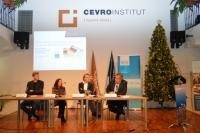Media, Internet, Security, Propaganda and Censorship: German Experience
Date of event: 28.11. 17:00 - 28.11. 2019 19:00

The Prague Centre for Transatlantic Relations of the CEVRO Institute (PCTR) in cooperation with Hanss Seidel Stiftung (HSS) organised a public debate “Media, internet, security, propaganda and censorship: German experience”
The debate took place on Thursday, November 28, 2019 from 5:00, in the atrium of the CEVRO Institute (Jungmannova 17, Prague 1).
The debate was be introduced and moderated by Tomáš Pojar, Vice-Rector of CEVRO Institute. The main guests were Daniel Kaiser, Czech journalist writing for Echo24, Alexandra Mostýn, German journalist, Foreign correspondent for Die Tageszeitung and Pavel Polák, Czech journalist, Berlin correspondent of Diary N.
Germany as a key neighbour for the Czech Republic
Thursday’s debate on “Media, Internet, Security, Propaganda and Censorship: German Experience” was opened and moderated by Tomáš Pojar. The main point of the whole debate was freedom of speech and how it is limited (eg in universities). The guests were three journalists looking at the issue many times quite differently, so the debate was really successful. Pojar firstly reflects his own experience of non-free words from friends from Germany who praise the standard of life but who are not free to express themselves on topical topics such as migration.
The first to speak was German journalist Alexandra Mostýn. According to her words, there was greater freedom of speech in the past and at the same time, this freedom was more accepted. The actual opinion was considered something positive, today as bad. At present, there is only one truth, and other opinions differing from this “truth” are taken negatively. Unfortunately, this development is also reflected in the private sphere. For example, the student’s parents choose the political party AfD, but the student does not want to choose that party. She can’t talk to her family about this, so what do I do ?!
This was followed by Pavel Polák. He said that the overall situation in the media does not correspond to how Germany perceives it. He agreed that there was indeed conflict within families. Families often do not know whether they should perceive the issue positively or negatively, whether it is good or not to welcome refugees. But he did not agree with the idea that some current would be oppressed. In the German parliament and provincial councils there are a number of parties that speak diametrically differently.
Daniel Kaiser, the third guest, mentioned several successive events he cited as examples of oppression of freedom of speech.
* 29 October (Hamburg) where demonstrations were held that Angela Merkel commented that it was not possible to do things like there.
* November 11 (Munich), a climate and energy organization, was scheduled to have a conference at one of its hotels, but it cancelled its reservation and did not rent the premises.
* 13 November (Stuttgart), Climate Conference again to be held at the University of Stuttgart, where prominent climaskeptics were invited. Again this action banned, the university cancelled.
* November 26, a contribution on social networks that many human lives and material losses have been sacrificed due to fundamentalism. The same author in the final denied his statement and the problem, therefore, does not exist.
Kaiser believes that the situation five years ago and now is far more dramatic and that the main problem is the migration crisis.
Polák added that it is not just a media, but a nationwide discussion. In 2017, the law on the enforcement of the law on social networks was adopted, which clearly limits the freedom of speech. Public debates have been intensified many times, but social media initiatives that should influence the media will take some time. Also, the media do not have a precise way to communicate information.
Mostýn joined that the above mentioned Social Networking Act does not really work. As far as television broadcasts are concerned, in her opinion, they say what people should think and influence.
Pojar mentioned social networks as a partial escape from the restriction of freedom. His subjective opinion is that the German situation is slowly beginning to move to the Czech Republic.
Kaiser is sceptical and does not think the situation is improving. Mostyn just added that the right-wing attacks are discussed more than the left-wing ones.
Polák mentioned statistics that people who accused the local press of lying information eventually were people who did not really follow the press, or read at least.
Kaiser mentioned a comparison of the problem in our country when the Prime Minister owns the media. In Germany, such a situation is unthinkable and unimaginable.
Mostýn ended the debate that the pressure is not from Muslim but primarily from German structures.

